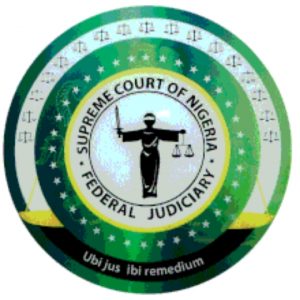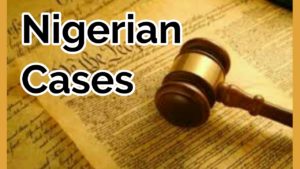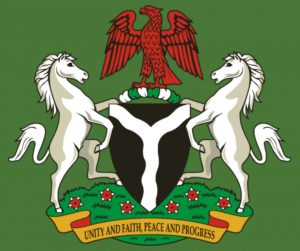DSS V Agbakoba: The breach of right to freedom of movement extends to acts which makes it impracticable for one to exercise his choice of movement in and out of the country. The seizure of the respondent’s passport by the State Security Service is an act not within their powers, yet, it was effected without compliance with the requirement of the relevant statute. This is the height of its unconstitutionality.

Recommended: Garba v University of Maiduguri: Fact, Issues and Judgment
Issues for Determination in DSS V Agbakoba
a. The right to hold a passport by Nigerian citizens in relation to the fundamental right of freedom of movement
b. Default of pleadings in a matter brought by way of originating motion
Also see: Advantages and Disadvantages of being a Lawyer

Facts of the Case of Director of State Security Service & Anor V Olisa Agbakoba (1999) 3 NWLR (PT. 595)
The applicant/ respondent, Olisa Agbakoba, a legal practitioner, brought a motion on notice in the High Court of Lagos against the respondents for the breach of his fundamental human right. The motion was brought pursuant to the Fundamental Rights (Enforcement Procedure) Rules cap 62. The fact of the case was that on the 21st of April, the applicant had his passport No A6541141 seized by the officers of the State Security Service. The applicant was at that time the president of Civil Liberties Organization (CLO), a nongovernmental organization with the objective of promoting human rights organizations. He was invited for a conference at Hague by the Netherlands Organization for International Development and Cooperation (NOYIB).
On his way to board a plane at Murtala Mohammed Airport, he was accosted and held back by the agents of the State Security Service who seized his travelling passport and then invited him to their director’s office. The reason for the seizure of his passport was not made known to him. He thereafter honoured the invitation to the State Security Service Director’s office who he found was not available in his office. Several other appointments were rescheduled and he still could not meet the director.
Recommended: Differences Between A Barrister And a Lawyer

He then made a complaint to the Attorney General of the Federation informing him of this encounter with the State Security Service whose action has rendered his travel impossible, after which the applicant instituted this action contending that the action of the State Security Service through their agents amounts to violation of his fundamental right of personal liberty, freedom of movement, freedom of thought and expression as provided for in the 1979 constitution.
On the freedom of thought and expression, his base of contention was that the act of seizing his passport prevented him from imparting the knowledge which was to be acquired from the conference. The applicant thereon sought a declaration that the action of the State Security Service is illegal and unconstitutional, an order for the release of his passport so seized, and a perpetual injunction restraining the respondent from further seizing of his passport. The respondent/appellants neither contended nor controverted the claims of the applicant/respondent.
Recommended: Best Law Apps: 11 Legal Apps for Lawyers and Law Students (2021)

Decision of Director of State Security Service & Anor V Olisa Agbakoba
The trial court held that the applicant had failed to establish to the satisfaction of the court that the passport seized was his personal property and that he as a legal right. The trial court further stated that the passport is a government property which can be withdrawn at any time as was imprinted as caution on the body of the passport. The trial court based on this ground held in favour of the respondent/appellant. Being dissatisfied, the respondent went on appeal to the Court of Appeal.
The appeal was allowed, setting aside the decision of the trial court. Court of Appeal held that the seizure of the applicant’s passport was a direct infringement of his right to exit the country which amounts to violation of his freedom movement. On the issue of the passport being a government property, Court of Appeal held that it would be a blatant arbitrariness to hold that a bearer of passport does not have a legal right over his passport whereas he can actually exercise all the incidences of ownership with respect to it.
The imprint on the passport that it can be withdrawn at any time is unconstitutional and does not represent the true purpose of the law.
The appellant being dissatisfied filed an appeal to the Supreme Court. The Supreme Court in determining the appeal posed the question as to whether the State Security Service has the right to withdraw a citizen’s passport. Supreme Court observed that it is the power of the Minister of Internal Affairs to withdraw a citizen’s passport. This power can as well be delegated. It was not shown in this case that the Minister of Internal Affairs delegated such power to the State Security Service.
Also in the exercise of this power by the Minister of Internal Affairs or its delegate, the reason for the withdrawal or seizure of a citizen’s passport must fall within those provided in the relevant statute. Such reason must as a requirement of law, be stated and be published in the Federal Gazette coupled with the details of the passport. The act of seizing the respondent’s passport in this case also did not fall within the exception which constitutes the circumstances under which the non-absolute right of freedom of movement can be derogated upon.
The Supreme Court affirmed the decision of the Court of Appeal and held the seizure of the respondent’s passport by the officers of the State Security Service to be illegal and unconstitutional, being an infringement upon the respondent’s right to freedom of movement. The court desisted from answering the question as to whether the right to freedom of movement is concomitant to the right to hold a passport, since the substance of the issue has been disposed of.
Recommended: Differences Between Custom and Customary Law
On the second issue which was that the Court of Appeal granted a declaratory relief in favour of the respondent while the appellants were in default of pleading, the Supreme Court upheld the decision of the Court of Appeal to the effect that the trial court was wrong to have refused the declaration. The respondent’s case was brought by way of originating motion; therefore, the default of pleading by a party does not preclude the court from granting a declaration.

Edeh Samuel Chukwuemeka, ACMC, is a lawyer and a certified mediator/conciliator in Nigeria. He is also a developer with knowledge in various programming languages. Samuel is determined to leverage his skills in technology, SEO, and legal practice to revolutionize the legal profession worldwide by creating web and mobile applications that simplify legal research. Sam is also passionate about educating and providing valuable information to people.